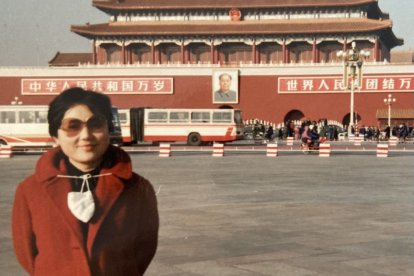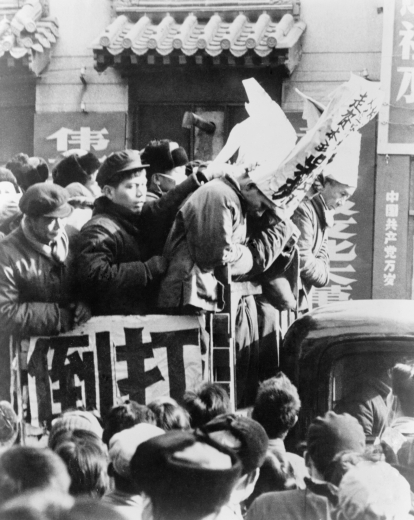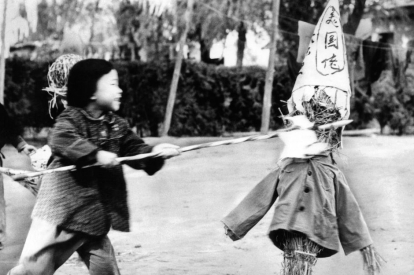"I survived the Chinese Cultural Revolution, I'm living the same with the 'woke virus' in the U.S."
Voz Media talks to Xi Van Fleet, a survivor of the "chaos" of Mao's government, who explains why knowing the history of socialism is essential to fight it today.

(Cortesía de Xi Van Fleet)
The first thing Xi Van Fleet remembers are the dazibao hanging on the high wall of the cafeteria. Large, handwritten, these posters appeared in the school overnight. "They were like social media back then," she explains.
As she was small, she barely understood its contents, but by picking up some words and drawings she managed to deduce that they were denunciations against her own teachers and directors. That was the beginning, for her, of the Chinese Cultural Revolution: a Mao policy that cost as many as two million lives, by some estimates, and crippled the nation' s economy.
Voz Media talks to this survivor about her experience during the "chaos" of Mao Zedong's days and explains why knowing the history of socialism is essential to detect and combat it today.
Van Fleet has become an exception. Not for having lived through and survived those tumultuous years - "my experience is not unique, there are hundreds of thousands of Chinese that lived through the Cultural Revolution" - but for having decided to turn to activism based on the lessons she learned from then. Although Van Fleet has been part of a conservative group in Virginia for at least two years, her name began circulating in major national media and universities across the country after a speech she gave to the Loudoun District School Board.
In the viral video of her appearance, Van Fleet asserts that the American education system has been training children "to be social justice warriors, to loathe our country and our history" and assures that, for this purpose, it uses the same strategies resorted to by the Chinese Communist Party.
In China
"Mao started a revolution without the military, he didn't need to," Van Fleet recalls those days in 1966 when the Cultural Revolution began."He had an army of indoctrinate kids."
Van Fleet was then close to seven years old. She was in elementary school, precisely where, she explains, the spark of uncontrol was ignited. "There was one teacher, the first grade teacher. She was petit and always trying to be pretty. That was considered bourgeois. The other kids went after her, called her names and started to spit on her. Eventually she was covered from head to toe."
She also recalls that she did not experience the most violent episodes, because she was very young. But she did hear daily stories about how in "such and such a high school" a teacher had been murdered or in "such and such place" the principal had been tortured.

Red Guards parade their victims through the streets of Beijing, forcing them to wear donkey hats and posters of their 'crimes'.
Red Guards parade their victims through the streets of Beijing, forcing them to wear donkey hats and posters of their 'crimes'. / (Cordon Press)
The Great Proletarian Cultural Revolution was, in reality, a palace coup within the Chinese Communist Party. Mao Zedong sought to regain prominence after being relegated to the background by the failure of his Great Leap Forward policy -which cost 20 million lives-. Mao argued that he intended to purge society of any bourgeois or anti-revolutionary - or, simply, not revolutionary enough - traces, including hierarchies such as the authority of the teacher or parents. And for that he chose as soldiers the youngest, grouped in improvised militias that were baptized as "Red Guards".
Van Fleet sums up that era in two words: "Absolute chaos". The school closed for two years, so she saw her first-grade education interrupted and skipped two years of schooling. And, when she finally returned, all books were banned - even communist ones, for not being "radical enough" - except the Little Red Book, a compendium of Mao's quotes that the children repeated (and sang) until they knew them by heart.
Do what you are told
When did you realize you were being manipulated? "I did not realize until I got into college, after Mao's death." As China began to open up to the world, Van Fleet gained access to international media and realized that with only one source of information "you can't think". "Only when I started to get different sources of information I started to think."
At the same time, her his vision of North America begun to change. When she was little, she was told that it was "an evil country, where they oppressed people". But in the Hollywood movies that became available at that time she saw another country, one in which the protagonists made her desire a lifestyle unimaginable until then.

A girl in Changchow, China, spears an effigy with a sign reading
A girl in Changchow, China, sticks a spear into an effigy with a sign reading "bad Americans" during the Cultural Revolution (Cordon Press).
She then decided to migrate to the United States because "it was paradise, everyone knew it". Initially, when recently arrived in the country on a student visa, Van Fleet's motivation was only material. To have the luxurious life she had seen in the feature films. But once here, she was overcome by a doubt: how is such prosperity possible? "In the past ten years I spent a lot of time reading the history of this country." The answer, she now believes, are, among others, freedom and cultural assimilation. The attack she perceives against these fundamentals of American life is precisely what impelled her to begin her activism.
Cancelled... in the United States
"Our goal is to not bring someone that is harmful, we need to vote based on safety and comfortability." This was the opinion of one of the representatives of the Associated Students of Whitworth University about Van Fleet. Another said, "(It's important to recognize) the types of communities that she does not stand for." "I personally feel I could be affected by this speaker," added a third student of the fourteen who voted to withdraw her invitation to speak on the university campus.
Minutes of the meeting at which representatives of the Whitworth Alumni Association voted to veto Van Fleet:
2022-23 ASWU Meeting Minutes by Santiago Adolfo Ospital on Scribd
"They have the courage of shutting me down, but not of having an open conversation," says Van Fleet. Because, she argues, that's what they were taught, to silence "the one who doesn't think like you." "That’s marxist ideology, you don’t engage with the other side. You shut it up."
That way of thinking "has (taken hold of) most of the universities." That is why Van Fleet gives speeches on the history of communism in educational institutions all over the country. And what do you find in the students? Little knowledge of history. Little and biased, for example: "They taught them that America is evil because it used to have slavery. What they hadn't been taught is that the institution of slavery is as old as humanity and that their ancestors fought a war to end it -and that they should be glad."
"When I tell them my experience and they see how similar it is to theirs they are surprised," says the activist and lists parallels, "We’re talking about vandalizing statues, changing names of streets, attacking religion."
One of the worst consequences of indoctrination, she argues, is that young people choose to use the freedom they inherited to make decisions against that very freedom. Like deciding, voluntarily, not to argue with those who profess contrary opinions or not to seek alternative sources of information to contrast data.
Marxism, the root of the problem
"The Chinese Communist Party divided people by race, if you were rich you were bad, if you were poor you were good," Van Fleet explains. "Here in America they are doing the same. Bernie Sanders, for example, talks about the 1% against the 99%
However, she argues, over time this segregation becomes insufficient. New reasons must always be created to divide the population. So race, sexual preferences, whether one is vaccinated or not... "It is a marxist tactic to divide people, give them certain identity and use it to divide them."
The current gender movement is a good case in point, she argues: once the enemy was heterosexuals, now transgenderism labels homosexuals and bisexuals as oppressors. Another is Critical Race Theory. "The white are deemed as oppressor, evil no matter what." It doesn't even matter if they only arrived in the country last year, only skin color matters.
Divide and re-divide and re-divide. The same, she insists, as Mao did. But why this effort to incessantly segregate the population? "So the different groups fight against each other. Then they are easier to control."
Exporter of woke
"The root of the woke is Marxism," Van Fleet affirms. Those who do not understand it, it is because they do not know the past of this ideology. Elon Musk and Bill Maher, in a recent interview, wondered what the origin of the 'woke virus' was, and they themselves didn't know the answer. Going into detail, Van Fleet assures that this virus arrived in the United States from Germany, with the thinkers of the Frankfurt School, who settled at Columbia University during the 1930s.
Since then, the 'woke virus' has grown so much that it has even taken root in "the heart of American civilization". So much so that today it is the United States itself that exports it around the globe, says Van Fleet. Above all, to Latin America.
What can be done?
Van Fleet is cautious when asked for possible solutions. She points out that in her personal case, the answer is to share experience, but she understands that not everyone can do so.
Although everyone can resist. At the very least, Van Fleet argues, it is necessary to stop complying with 'woke' mandates, even if there is a reasonable fear of losing one's job or popularity. And finally (and "ideally"), organize: "The left always organizes itself, people from the right need to work together to defend their freedom."
RECOMMENDATION





















